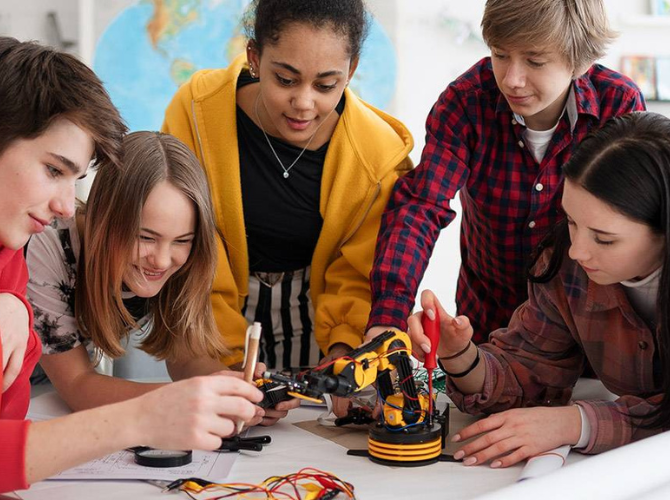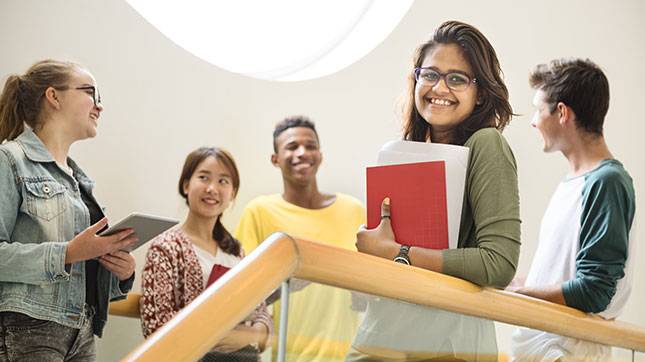PISA 2022 sees unprecedented drop in student assessments in most nations: OECD report

OECD says that the decline in maths performance is three times greater than any previous consecutive change
With the exception of a handful of East Asian nations, the eighth round of the OECD Programme for International Student Assessment (PISA) 2022 has seen a drastic fall in capabilities of students living in 81 nations, says the organisation that represents the richest nations in the world.
In a press statement OECD says that the PISA test was originally scheduled for 2021, but had to be postponed due to Covid-19 pandemic and making it the first large-scale study with data on how the pandemic has affected student performance and well-being.
The PISA 2022 tested nearly 700,000 15-year-old students in 81 OECD member countries and partner economies on mathematics, reading and science. This edition, with a focus on maths, was also the first to collect data on student performance, well-being and equity before and after the Covid-19 pandemic.
Overall, on average, the PISA 2022 assessment saw an unprecedented drop in performance across the OECD. Compared to 2018, mean performance fell by 10 score points in reading and by almost 15 score points in maths.
The OECD adds that the sharp decline in maths performance is three times greater than any previous consecutive change, and particularly significant in countries such as Germany, Iceland, the Netherlands, Norway and Poland, which all saw a drop of 25 score points or more in maths between 2018 and 2022.
The OECD says that the decline in performance can only partially be attributed to the Covid-19 pandemic, with falling scores in reading science and maths already apparent prior to 2018.
“Since its launch in the year 2000, PISA has proven to be an effective catalyst for reform to boost the quality and impact of education systems around the world. It is a powerful tool that policymakers can use to ensure their education systems are as effective as they can be. Education and skills are fundamental to ensuring young people have the best possible opportunities to develop, to adapt to a rapidly changing world, to contribute, to participate, to get ahead and yes to benefit from the opportunities in front of them in our economies and societies,” said OECD Secretary-General Mathias Cormann said launching the report in Paris.
“PISA 2022 helps to identify the comparative strengths of education systems that have performed well despite recent shocks. This enables policymakers across the 81 participating countries and economies to rely on these insights, adapting them to their particular circumstances as required and pursue reforms to education systems for a brighter, more prosperous future,” Cormann added.
On the upside, many countries, including Cambodia, Colombia, Costa Rica, Indonesia, Morocco, Paraguay and Romania, have rapidly expanded access to education over the past decade, for example, making significant progress towards universal secondary education.
In maths, Singapore and five other East Asian education systems, Macao (China), Chinese Taipei, Hong Kong (China), Japan and Korea, outperformed everyone else. These same countries and economies were the next highest performers in science, along with Estonia and Canada. In reading, Ireland performed as well as Japan, Korea, Chinese Taipei and Estonia.
A further 10 countries and economies saw both a large share of all 15-year-olds gain at least basic proficiency in maths, reading and science, and high levels of socio-economic fairness in terms of outcomes. These include Canada, Denmark, Finland, Hong Kong (China), Ireland, Japan, Korea, Latvia, Macao (China) and the United Kingdom. While socio-economic status remains a significant predictor of performance, education in these countries and economies can be considered more equitable than others, it says.
Analysing the impact of the Covid-19 pandemic, around half of the students across the OECD experienced closures for more than three months. But the results show no clear difference in performance trends between education systems with limited school closures such as Iceland, Sweden and Chinese Taipei and systems that experienced longer lasting school closures, such as Brazil, Ireland and Jamaica.
The study also finds that the availability of teachers to help students in need had the strongest relationship to maths performance across the OECD. Maths scores were 15 points higher on average in places where students agreed they had good access to teachers’ support. These students were also more confident than their peers to learn autonomously and remotely. Despite this, only one in five students overall reported having received extra help from teachers in some lessons in 2022. Around 8 pc never or almost never received additional support.
The survey also reveals the fast-changing impact of technology on children’s educational performance. PISA shows that moderate use of digital devices in school is associated with higher performance, but this depends on the technology being used to support rather than distract from learning.
On average across OECD countries, students who spent up to one hour a day on digital devices for leisure scored 49 points higher in maths than students who spent between five and seven hours per day, after taking into account students’ and schools’ socio-economic profile.
It adds that 45 pc of students reported feeling nervous or anxious if their phones were not near them, on average across OECD countries, and 65 pc reported being distracted by using digital devices in at least some maths lessons. The proportion topped 80 pc in Argentina, Brazil, Canada*, Chile, Finland, Latvia, Mongolia, New Zealand and Uruguay.
Students who reported being distracted by other students using digital devices in some, most or every maths class scored 15 points lower in PISA maths tests than those who barely experienced this. This represents the equivalent of three-quarters of a year’s worth of education, even after accounting for students’ and schools’ socio-economic profile.
Preparing students for a changing world
During years of disruption during which many countries and economies saw student learning outcomes decline, Japan, Korea, Lithuania and Chinese Taipei were able to maintain or improve learning outcomes, fairness in the distribution of learning opportunities, and student well-being.
Singapore led the global league tables in the mathematics assessment, followed by Macao (China), Chinese Taipei, Hong Kong (China), Japan and Korea. While overall performance levels declined, some education systems made progress towards closing the achievement gap.
The OECD says that 18 countries and economies performed above the OECD average in mathematics, reading and science in 2022. Between 2018 and 2022, mean performance in mathematics across OECD countries fell by a record 15 points. Reading fell 10 points, twice the previous record, whereas science performance did not change significantly. On average, reading and science trajectories had been falling for a decade, though math had remained stable between 2003-2018. Colombia, Macao (China), Peru and Qatar improved in all three subjects on average since they began to take part in PISA.
Supporting students in and beyond the classroom is key
Socio-economically disadvantaged students in OECD countries are seven times more likely on average than advantaged students not to achieve basic mathematics proficiency. However, across the OECD, 10 pc of disadvantaged students scored in the top quarter of mathematics performance in their own country.
Some countries/economies ensure that students attain a high level of mathematics performance despite socio-economic background. In Macao (China), the most socio-economically disadvantaged students scored higher than the OECD average. Boys outperformed girls in mathematics by 9 points but girls surpassed boys in reading by 24 points on average.
The OECD goes on to make some recommendations for the governments to improve education standards.
Keep schools open longer for more students
Across PISA-participating economies, at least half of students experienced Covid-related school closures for three months or more. Systems that spared more students from longer school closures scored higher while their students enjoyed a greater sense of belonging at school.
Prepare students for autonomous learning
Students whose teachers were available when schools were closed scored higher in mathematics and were more confident about self-directed learning. Most were confident about using digital learning platforms and finding learning resources, but only 60 pc were confident about motivating themselves to do schoolwork.
Build strong foundations for learning and well-being for all students
More than 10 of students in some OECD countries suffer economic food insecurity, others have rates below three per cent. Between one in 20 and one in 10 students disagreed that they feel safe in schools on average across OECD countries.
Students who spent up to one hour per day on digital devices for learning activities in school scored 14 points higher on average in mathematics than students who spent no time. Enforced cell phone bans in class may help reduce distractions but can also hinder the ability of students to self-regulate their use of the devices.
Strengthen school-family partnerships and keep parents involved
The OECD says that higher-performing students reported that their family regularly eats the main meal together, spends time just talking with them, or asks them what they did in school that day. They also report better sense of belonging and life satisfaction.
Delay the age at selection into different education programmes
In systems where students are selected into different curricular programmes at an earlier age, a stronger association between students’ socio-economic background and their performance is observed.
Provide additional support to struggling students instead of requiring them to repeat a grade
Education systems where fewer students had repeated a grade tend to score higher and achieve socio-economic fairness. On average across the OECD, teacher support to students deteriorated from 2012 to 2022. Some 30 pc of students did not report that the teacher regularly gave extra help when students needed it and continued teaching until students understood.
Ensure adequate, high-quality education staff and materials
On average, school principals in 2022 were more likely to report a shortage of teaching staff than in 2018, while they were less likely to report a shortage of educational material than in 2018.
Establish schools as a hubs for social interaction
In systems where peer-to-peer tutoring became more prevalent between 2018 and 2022, students’ sense of belonging at school strengthened during the period.
Combine school autonomy and quality assurance mechanisms
The greater the autonomy granted to schools, the higher the average mathematics performance, but this was more likely when education authorities and schools had certain quality assurance mechanisms in place.











